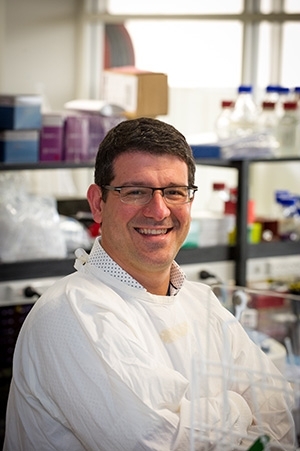Battle moves to hosts in virus research
Research news
A new approach to combating viruses is showing promise in the fight against emerging infectious disease threats, such as avian influenza (‘bird flu’ H5N1 and H7N9).
Until now, modifying host responses, to reduce overactive immunity and downstream pathology, has been an untried approach to combating these potentially fatal viruses. Associate Professor John Stambas, from Deakin’s School of Medicine, has achieved promising results by taking this new angle in his laboratory research.
Associate Prof Stambas recently received an American Association of Immunologists’ Travel Grant for mid-career researchers, to share his findings with 3,500 colleagues at the 4th European Congress of Immunology in Vienna in early September.
“Current interventions for flu target the virus, either through vaccines or anti-virals,” he said. “We are looking at changing the host’s response, so they have less symptoms, through next generation immuno-modulatory agents.”
“When animals, including humans, get high pathogen flus, like bird flu, we can have an overwhelming response and are almost drowned in our own secretions. If we can reduce these symptoms, it won’t matter so much if we get the virus.”
Associate Professor Stambas explained that another disadvantage of targeting viruses is that they evolve and develop resistance fairly quickly, requiring new vaccines to be developed every three to four years.
He and his team have succeeded in inhibiting molecules called reactive oxygen species that are produced by a host as part of its immune response. To date, they have reduced response to avian influenza virus in cells and, using the drug apocynin, reduced response to normal flu in mice. This drug is currently being used in asthma trials and is safe for human use.
“This research is indicating a promising future direction,” said Associate Prof Stambas. “If used in combination with anti-virals, both host and virus would be targeted, reducing both the impact and spread of the virus.”
With a strong background in immunology, virology and molecular biology, the Stambas group (consisting of two post-doctoral scientists and 4 PhD students) is situated at CSIRO’s Australian Animal Health Laboratory.
Through a Memorandum of Understanding between Deakin and CSIRO, the researchers have access to world class high level biocontainment laboratories.
Share this story
 Pioneering a new approach to virus research - Associate Professor John Stambas.
Pioneering a new approach to virus research - Associate Professor John Stambas.
